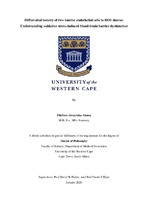| dc.description.abstract | The blood-brain barrier (BBB) is a critical interface between the blood circulation and brain tissue which performs critical selection of circulating molecules that gain access to the brain tissue. Its unique ability to adjust to changes in the constituents of the blood circulation confer in the BBB a dynamic nature enabling changes in its properties to suit the homeostatic needs of the brain.
Dysfunction of the BBB has been established to be pivotal to the initiation and/or maintenance of an array of neurological disorders, most of which involve the production of excess reactive oxygen species (ROS) and oxidative stress in their pathophysiology. Thus, clinical trials of exogenous antioxidant agents have been proposed and initiated, with most results being inconclusive. Extensive studies of the impact, capacity and plasticity of endogenous antioxidants in the cells that constitute the blood-brain barrier, especially the brain endothelial cells, therefore, became necessary for the rational choice, timing, and the mode of application of antioxidants in the management of oxidative stress-mediated neurological diseases. | en_US |

